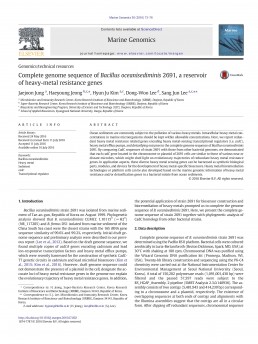Click the link above for more details.
Complete genome sequence of Bacillus oceanisediminis 2691, a reservoir of heavy-metal resistance genes
Abstract
Ocean sediments are commonly subject to the pollution of various heavy metals. Intracellular heavy metal concentrations in marine microorganisms should be kept within allowable concentrations. Here, we report redundant heavy metal resistance related genes encoding heavy metal-sensing transcriptional regulators (i.e. cadC), heavymetal efflux pumps, and detoxifying enzymes in the complete genome sequence of Bacillus oceanisediminis 2691. By comparing CadC sequences of strain 2691 with those from other bacterial genomes, we demonstrated that each cadC gene located in the chromosome or plasmid of 2691 cells are similar to those of various near or distant microbes, which might shed light on evolutionary trajectories of redundant heavy metal resistance genes. In application aspects, these diverse heavy metal sensing genes can be harnessed as synthetic biological parts, modules, and devices for the development of heavy metal-specific biosensors. Heavymetal bioremediation technologies or platform cells can be also developed based on the marine genomic information of heavy metal resistance and/or detoxification genes in a bacterial isolate from ocean sediments.
CategoryPeer-reviewed PublicationsDate2016.07Linkwww.ncbi.nlm.nih.gov
